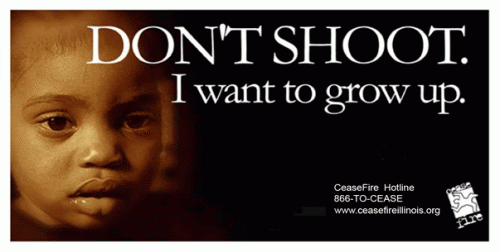CeaseFire began operations 10 years ago in one of Chicago's most violent neighborhoods. Within a year, the project reduced shootings by 67%. These results have since been replicated dozens of times in Chicago, other US cities and abroad including Iraq. An extensive three-year independent evaluation funded by the US Department of Justice provided statistical proof that CeaseFire's model was directly responsible for the dramatic decline in killings. Indeed, "this evaluation scientifically-validated CeaseFire’s success in reducing shootings and killings by 41% to 73% and demonstrated a 100% success rate in reducing retaliatory killings in five of the eight communities examined."
 Thanks to PopTech, I was able to meet with the CeaseFire team in Chicago on two occasions this year. This is truly one of the most stunning projects I've come across in a long time. Members of the CeaseFire team are true professionals. They prove that preparedness is fundamental to successful tactical early warning and response. Having worked in the field of conflict early warning and rapid response for years, I've always known that a people-centered approach to violence prevention would be far more effective than a state-centric approach. CeaseFire demonstrates this beyond the shadow of a doubt. The model itself is based one how diseases are controlled, which is fascinating.
I'm incredibly excited to be part of PeaceTXT, a joint PopTech, CeaseFire, FrontlineSMS:Medic and Ushahidi initiative to explore how technology might help the team leverage and scale their incredible work. From the PopTech website:
Thanks to PopTech, I was able to meet with the CeaseFire team in Chicago on two occasions this year. This is truly one of the most stunning projects I've come across in a long time. Members of the CeaseFire team are true professionals. They prove that preparedness is fundamental to successful tactical early warning and response. Having worked in the field of conflict early warning and rapid response for years, I've always known that a people-centered approach to violence prevention would be far more effective than a state-centric approach. CeaseFire demonstrates this beyond the shadow of a doubt. The model itself is based one how diseases are controlled, which is fascinating.
I'm incredibly excited to be part of PeaceTXT, a joint PopTech, CeaseFire, FrontlineSMS:Medic and Ushahidi initiative to explore how technology might help the team leverage and scale their incredible work. From the PopTech website:
 Thanks to PopTech, I was able to meet with the CeaseFire team in Chicago on two occasions this year. This is truly one of the most stunning projects I've come across in a long time. Members of the CeaseFire team are true professionals. They prove that preparedness is fundamental to successful tactical early warning and response. Having worked in the field of conflict early warning and rapid response for years, I've always known that a people-centered approach to violence prevention would be far more effective than a state-centric approach. CeaseFire demonstrates this beyond the shadow of a doubt. The model itself is based one how diseases are controlled, which is fascinating.
I'm incredibly excited to be part of PeaceTXT, a joint PopTech, CeaseFire, FrontlineSMS:Medic and Ushahidi initiative to explore how technology might help the team leverage and scale their incredible work. From the PopTech website:
Thanks to PopTech, I was able to meet with the CeaseFire team in Chicago on two occasions this year. This is truly one of the most stunning projects I've come across in a long time. Members of the CeaseFire team are true professionals. They prove that preparedness is fundamental to successful tactical early warning and response. Having worked in the field of conflict early warning and rapid response for years, I've always known that a people-centered approach to violence prevention would be far more effective than a state-centric approach. CeaseFire demonstrates this beyond the shadow of a doubt. The model itself is based one how diseases are controlled, which is fascinating.
I'm incredibly excited to be part of PeaceTXT, a joint PopTech, CeaseFire, FrontlineSMS:Medic and Ushahidi initiative to explore how technology might help the team leverage and scale their incredible work. From the PopTech website:
The PeaceTXT project brings together some of the world’s best technologists and social innovators to explore how mobile tools and mobile messaging might further accelerate CeaseFire’s ability to engage communities, change social norms, improve its efficacy and find new paths to scale. Our investigation is broad but intensive, exploring and rigorously evaluating several possible applications.
While the initial work will focus on CeaseFire’s efforts in its model sites in Chicago, there is clear potential to apply key insights and methods to the global context. Experience and learning gained from this project is expected to prove invaluable to conflict resolution and violence prevention efforts, nationally and globally.
The project was publicly launched and announced last week at PopTech 2010 thanks to seed funding from the Rita Allen Foundation. My colleague Josh Nesbit and I have already learned a lot from the conversations we had in Chicago, but we know that we're just scratching the surface. So I'm eager to get back to Chicago and pilot some projects with the CeaseFire team. Thank you PopTech for bringing us together!